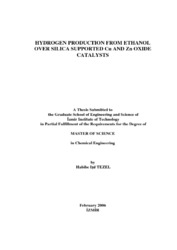Please use this identifier to cite or link to this item:
https://hdl.handle.net/11147/3422Full metadata record
| DC Field | Value | Language |
|---|---|---|
| dc.contributor.advisor | İnal, Fikret | - |
| dc.contributor.author | Tezel, Habibe Işıl | - |
| dc.date.accessioned | 2014-07-22T13:51:31Z | - |
| dc.date.available | 2014-07-22T13:51:31Z | - |
| dc.date.issued | 2006 | - |
| dc.identifier.uri | http://hdl.handle.net/11147/3422 | - |
| dc.description | Thesis (Master)--Izmir Institute of Technology, Chemical Engineering, Izmir, 2006 | en_US |
| dc.description | Includes bibliographical references (leaves: 46-48) | en_US |
| dc.description | Text in English; Abstract: Turkish and English | en_US |
| dc.description | ix, 48 leaves | en_US |
| dc.description.abstract | The majority of current energy needs are supplied by combustion of nonrenewable energy sources such as fossil fuels, which is associated with release of large quantities of greenhouse gases, especially carbon dioxide and other harmful emissions to the atmosphere. The gradual depletion of these fossil fuels reserves and efforts to combat pollution and greenhouse gas emissions have generated a considerable interest in using alternative sources of energy. Ethanol used in the hydrogen production process by steam reforming. The purpose of this work was to design a high performance catalyst for the production of hydrogen from steam reforming of ethanol. Ethanol steam reforming reaction is an endothermic reaction of ethanol with water to produce hydrogen and carbon dioxide. The different ZnO loading supported SiO2 catalyst and Cu promoted ZnO/SiO2 catalysts were prepared single step sol-gel method with different Cu loading. All catalysts were characterized by X-ray diffraction, BET surface area measurements and pore diameter analysis. BET surface area decreased and average pore diameter increased as the ZnO loading increased. Based on the XRD findings, it seems that zinc silicate crystallite phase is not formed under the preparation conditions used in this dissertation. The activity and selectivity tests of all catalysts were performed in a packed bed reactor with reaction temperature between 300 and 500oC. The performances of ZnO/SiO2 catalysts in ethanol steam reforming reaction were investigated as a function of ZnO loading. Cu catalysts are known as active catalysts for ethanol dehydrogenation. As the temperature was increased, the conversion increased and reached a maximum at 500oC for all Cu loadings. | en_US |
| dc.language.iso | en | en_US |
| dc.publisher | Izmir Institute of Technology | en_US |
| dc.rights | info:eu-repo/semantics/openAccess | en_US |
| dc.subject.lcc | QD505 .T35 2006 | en |
| dc.subject.lcsh | Catalysts | en |
| dc.subject.lcsh | Copper catalysts | en |
| dc.subject.lcsh | Hydrogen as fuel | en |
| dc.title | Hydrogen Production From Ethanol Over Silica Supported Cu and Zn Oxide Catalysts | en_US |
| dc.type | Master Thesis | en_US |
| dc.institutionauthor | Tezel, Habibe Işıl | - |
| dc.department | Thesis (Master)--İzmir Institute of Technology, Chemical Engineering | en_US |
| dc.relation.publicationcategory | Tez | en_US |
| dc.identifier.wosquality | N/A | - |
| dc.identifier.scopusquality | N/A | - |
| item.languageiso639-1 | en | - |
| item.grantfulltext | open | - |
| item.fulltext | With Fulltext | - |
| item.openairecristype | http://purl.org/coar/resource_type/c_18cf | - |
| item.openairetype | Master Thesis | - |
| item.cerifentitytype | Publications | - |
| Appears in Collections: | Master Degree / Yüksek Lisans Tezleri | |
Files in This Item:
| File | Description | Size | Format | |
|---|---|---|---|---|
| T000518.pdf | MasterThesis | 485.75 kB | Adobe PDF |  View/Open |
CORE Recommender
Page view(s)
316
checked on Jun 16, 2025
Download(s)
80
checked on Jun 16, 2025
Google ScholarTM
Check
Items in GCRIS Repository are protected by copyright, with all rights reserved, unless otherwise indicated.